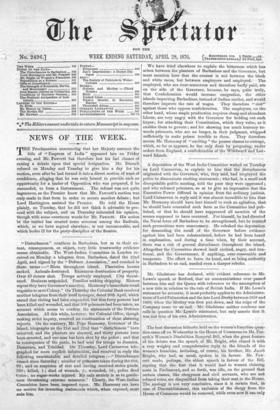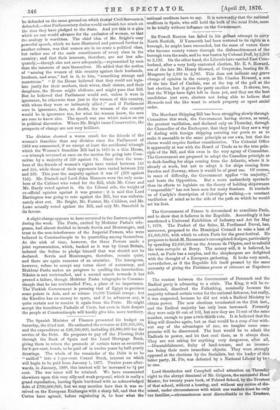The best discussion hitherto held on the women's franchise ques-
tion came off on Wednesday in the House of Commons on Mr. For- syth's Women's Disabilities Removal Bill, when the great feature of the debate was the speech of Mr. Bright, who closed it with a very weighty and comprehensive reply to the friends of the women's franchise, including, of course, his brother, Mr. Jacob Bright, who had, as usual, spoken in its favour. Mr. Faw- cett made, perhaps, the ablest speech in favour of the Bill, arguing that the fear that it would lead to women claiming seats in Parliament, and so forth, was idle, on the ground that certain classes, like clergymen and civil servants, who are not refused votes, are disqualified from taking their seat in the House. The analogy is not very conclusive, since it is certain that, in case of Disestablishment, this exclusion of the clergy from the House of Commons would be removed, while even now it can only
be defended on the same ground on which that of Civil Servants is defended,—that Parliamentary duties would encroach too much on the time they have pledged to the State. And yet this is a plea which no one would advance for the exclusion of women, so that the analogy is worthless. The chief idea of Mr. Bright's very powerful speech, which we have illustrated and pursued further in another column, was that women are in no sense a political class, but rather one of the main constituents of every class in the country ; and that their interests, therefore, are not less ade- quately,—though also not more adequately,—represented by men than the interests of men *themselves. He added that the notion of "arming the women of this country against their husbands, brothers, and sons," had in it, to him, "something strange and monstrous." "If the House believed that they could not legis- late justly for their mothers, their wives, their sisters, and their daughters, the House might abdicate, and might pass that Bill. But he believed that Parliament would not, unless it were in ignorance, be otherwise than just to the women of this country, with whom they were so intimately allied ;" and if Parliament were in ignorance, then, no doubt, the women of the country would be in ignorance too, for what the women know, the men are sure to know also. The speech was one which makes an era in political discussion. Where Mr. Bright turns Conservative, the prospects of change are not very brilliant.



































